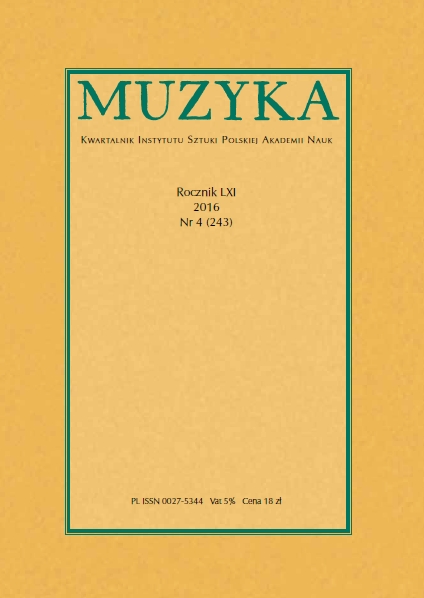Alternatywna historia odsieczy wiedeńskiej w operze „Wanda” Franza Dopplera (1850)
An Alternative History of the Relief of Vienna in the Opera 'Wanda' by Franz Doppler (1850)
Author(s): Ryszard Daniel GolianekSubject(s): Theatre, Dance, Performing Arts, Music
Published by: Instytut Sztuki Polskiej Akademii Nauk
Keywords: Opera; 'Wanda"; Franz Doppler; nineteenth-century music
Summary/Abstract: The Relief of Vienna (1683) is a historic event almost completely ignored by composers of operatic music, but the opera Wanda, premiered in Pest in 1850, is a notable exception. Its author Franz Doppler (1821–83), a Lviv-born composer of mixed Polish-German origin, was famous primarily as a flute virtuoso. The National Library in Budapest preserves a rich collection of manuscripts related to this work, consisting – apart from two complete scores and a piano reduction – of orchestral and vocal parts, and even director’s notes concerning details of stage performance. Several years after the first performance, other premieres followed, staged in operatic venues in Vienna, Stuttgart, Dresden, Riga, Darmstadt, and finally in the composer’s native city of Lviv (1874). The plot of the opera, referring to a battle that turned the tide of European history, is in fact very loosely based on the events that actually occurred in the seventeenth century. The attractiveness of the plot rests on the presentation of two circles of group characters: Poles and Turks. On many occasions, the composer employs stylistic elements related to Poland, mostly allusions to Polish folk dances, while in Act Two, set in the Turkish camp at Vienna, several oriental stylizations are introduced. For the most part, Doppler resolved to use clichéd and widely employed solutions, but in his attempt to recreate the Turkish circle faithfully his choices were more sophisticated and involved a selection of instruments, registers and colouring. Apart from these two styles, a major role in the work is played by the style drawing upon the standards of the wide-spread music idiom of the Italian bel canto opera. Only the two main characters use the idiom, and in their characteristics Doppler demonstrated his excellent command of the standards and principles of this nineteenth-century stylistic convention.
Journal: Muzyka
- Issue Year: 61/2016
- Issue No: 4
- Page Range: 3-22
- Page Count: 20
- Language: Polish

